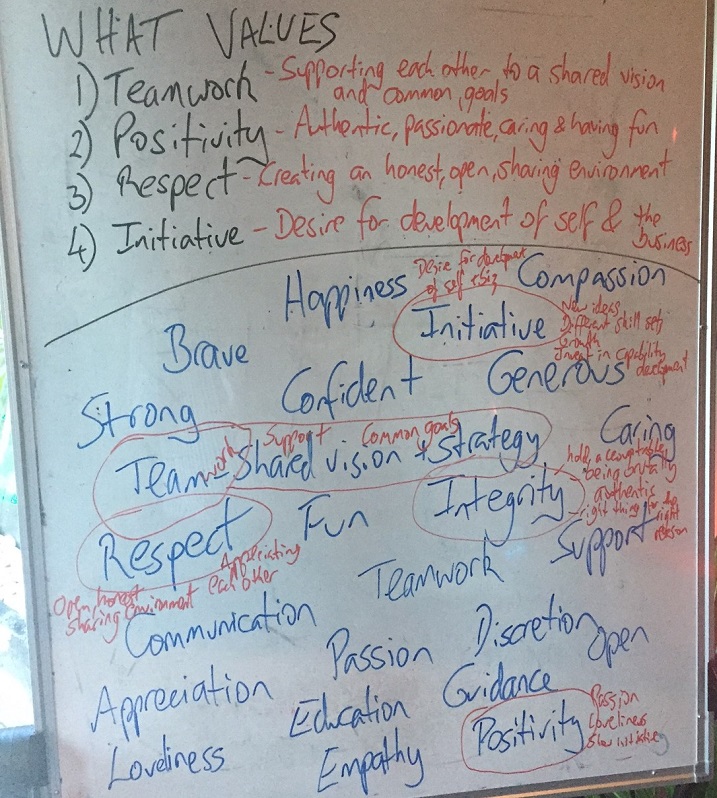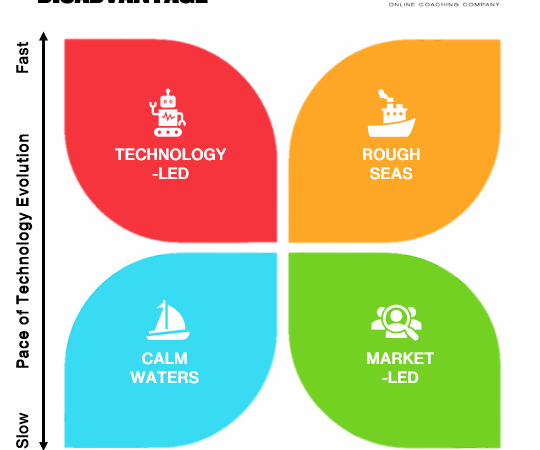This was sparked by a great discussion led by the #1 Best Selling author Penny Power, author of Business is Personal. I de-merged my advisory practice in 2019, so my business is back being 100% personal with all the advantages that offers.
My beautiful wife are I continue to implement the Vision and Business Strategy we agreed in early 2016. Part of that exercise was noting our Values, which we have refined to these four Core Values.
My Core Values
- Transparency
- Generosity
- Learning & Sharing
- Pace
How We Defined Our Core Values
Defining strong, integrated, and practical core values is a critical part of any Culture work I do with my mid-tier business clients. (See the video at the bottom of this page for a wider overview of a meaningful Culture Project.)
Whether you are a team, a couple, or an individual, the process I use and recommend is the same:
1) Brainstorm all the possible values, attributes, qualities etc that you want to display.
Keep this process going. There are no wrong answers, and it doesn’t matter how long the list becomes. A (large) whiteboard word cloud or writing freestyle on paper is better than an actual ordered list.
I start at the bottom of a whiteboard and work my way up.

2) Start categorising your list.
In the example picture above (from a sales business I coached), you can see how ‘Positivity’ was used to group things like ‘Passion’ and ‘Loveliness’. For me, things like Balance, Fun, Relax, Lifestyle all fit into (Living life at my) ‘Pace’.
Maybe an existing word sums up that category, maybe you need to add a new one.
3) Look for 3-5 Core Values.
More than that becomes hard to remember, and if they can’t be remembered they won’t be applied. This could mean categories of your categories, or identifying those that resonate most.
This is ABSOLUTELY an intuitive or emotional process – what feels right for you (or for your team, in a wider example).
It’s OK to say things like “I’m not sure why, it just feels right / wrong to me.”
4) I believe that your Values must be distinctive, which is to say that they must be a conscious choice to be / do things differently.
The best way to test this is to ask ‘Could a business be successful and respected while living the opposite of this Value?‘
If the answer is Yes, then your Value is distinctive – it’s perfectly OK (not very #ORS but OK) for a business to not be transparent, or to learn for internal application only, or to run at a very different pace to me.
It’s not OK for a business to be dishonest – so a Value like ‘Honesty’ isn’t distinctive, it should be a baseline in any business.
When I worked at McDonalds, the cheese was delivered in boxes marked “Processed Cheddar Cheese Food Product”. My rule than was ‘If you have to specify that it’s “Food”, it probably isn’t’.
If you have to specify that your business is “Honest” … it probably isn’t.
5) Define what each Value means in your Organisation.
Unlike Behaviours (again, see the video below), it’s difficult to manage a ‘Core Value’. Think of how your Values are going to be used – they are contextual decision-making filters that universally apply, so if a team member has to make a hard decision they can use your Values to guide them.
Since most of these broad concepts have multiple interpretations, it helps enormously if there’s a clear definition of what that value means to your business.
Here are my Values again, with their Definitions.
- Transparency – Lead by Example
- Generosity – Abundance First
- Learning & Sharing – Multiply Your Wisdom
- Pace – There is Always Enough Time
Pace is an unusual value, born from me being particularly ‘Slow Paced‘. Perhaps when you first read it, you may have interpreted the opposite – a desire to keep working at a fast pace and expecting the same from those around me? This definition confirms that Pace is personal – when we all work at our own optimal speeds then everything happens. There is always enough time.
With my client example above, see how ‘Initiative’ is defined to include ‘Desire for Development of Self’. It would be easy to assume that Initiative meant something like ‘take some responsibility in my business’, so they deliberately made it clear that this value starts with self and then impacts the whole team.
6) Once ‘decided’, let them percolate for a week or two.
Then return to them for a final decision – they almost always still feel right, sometimes they may not, so don’t treat this as a rushed exercise. Do it well so they will last.
This is also a good time to add the ‘Behaviours’ exercise, if you haven’t done it already. How are you actually living and managing your Core Values? For example, linked to Transparency (Lead by Example) I publish my income and net worth figures in every monthly update blog.
7) And then lastly, they’re not set in stone.
Revisit your Values on a regular basis (every 1-3 years) – not to change them necessarily, but to reaffirm them as correct.
Don’t live your Values because they were right for you 20 years ago, live them because you decided this year that they were STILL right for you.
Further Information on Core Values
I highly recommend Andrew Moore’s book Culture at Work.
I’ve already mentioned Penny Power’s Business is Personal, which is definitely relevant for leading with authenticity on every level.
Culture permeates all of my Start-up Business Guide, and Core Values are covered at depth in Chapter 23.
And here is the video I’ve been promising
I … hope this adds some value! Leave a comment below, Friend me on Facebook, or subscribe to my newsletter to also receive 3 free chapters from my latest business book.





[…] open I am sharing my income, equity, business wins and challenges. ‘Transparency’ is one of my core values after […]
[…] (Indeed, to overcome the misperception that ‘fast is better’, this balance is often described in the terms of Silicon Valley’s Paul Graham, who talks about ‘Manager’s Time versus Maker’s Time‘. It’s a topic I’ve written about previously as well. “Pace” has even become one of my company’s Core Values!) […]